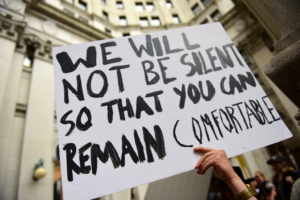In the tapestry of democratic governance, freedom of speech stands as a cornerstone, empowering citizens to voice their opinions without fear of reprisal. When a town council deviates from its role as a guardian of democratic values and violates this fundamental right, it demands urgent attention and action from the community. This article explores strategies to navigate the challenge posed by rogue town councils that trample on freedom of speech, emphasizing the need for vigilance, legal recourse, and community solidarity.
 Scottdale town council has apparently taken a strange path to begin 2024. Recent events are showing the possibility of council suppressing the voice of citizens at public meetings through use of a poorly worded, questionable document. While this may not seem like a matter of contention for the people of this town, one only needs to look at the recent history of this country to see that certain freedoms are being denied to people from the highest levels of government and media. It’s astonishing that the government of a town this size would implement this type of measure to ‘control’ the citizens. The following strategy is one of many possibilities for people to stand up against poor representation. Is it not a ‘call to arms’, and it is by no means, a definitive guide to any sort of civil disobedience. It is merely presented to make people think about how government, even on a small-town scale, can be as opressive as a large city.
Scottdale town council has apparently taken a strange path to begin 2024. Recent events are showing the possibility of council suppressing the voice of citizens at public meetings through use of a poorly worded, questionable document. While this may not seem like a matter of contention for the people of this town, one only needs to look at the recent history of this country to see that certain freedoms are being denied to people from the highest levels of government and media. It’s astonishing that the government of a town this size would implement this type of measure to ‘control’ the citizens. The following strategy is one of many possibilities for people to stand up against poor representation. Is it not a ‘call to arms’, and it is by no means, a definitive guide to any sort of civil disobedience. It is merely presented to make people think about how government, even on a small-town scale, can be as opressive as a large city.
Document and Expose:
The first step in addressing freedom of speech violations is to meticulously document instances where the town council curtails free expression. Recordings, meeting minutes, and any official communications should be scrutinized for evidence of censorship or suppression. By exposing these actions, residents can bring attention to the issue and garner support for rectifying the situation.
Legal Safeguards:
Understanding the legal dimensions of free speech protections is crucial. Seek legal advice to determine whether the town council’s actions infringe upon constitutional rights or violate local ordinances. Depending on the severity of the violations, explore legal avenues such as filing complaints with relevant oversight bodies, seeking injunctive relief, or pursuing legal action against the council for suppressing free expression.
Community Advocacy:
A united community is a formidable force against rogue councils. Organize grassroots movements and community forums to discuss the importance of freedom of speech and the impact of council actions on democratic values. Advocate for resolutions or public statements endorsing the protection of free expression. A well-informed and mobilized citizenry can apply significant pressure on the council to rectify its course.
Engage with Media:
Leverage media outlets to amplify the issue and garner public support. Write op-eds, letters to the editor, or collaborate with investigative journalists to shed light on the council’s transgressions. Media scrutiny not only brings attention to the violations but also holds the council accountable in the court of public opinion.
Public Demonstrations:
Peaceful demonstrations and protests can serve as a powerful means of expressing discontent and raising awareness. Organize rallies, public gatherings, or symbolic events to demonstrate community solidarity and commitment to defending freedom of speech. A visible and vocal public presence can bring additional pressure on the council to reconsider its stance.
Conclusion:
Addressing freedom of speech violations by a rogue town council is a multifaceted challenge that demands a strategic and collective response. Through documentation, legal safeguards, community advocacy, media engagement, and public demonstrations, residents can send a resounding message that the suppression of free expression will not be tolerated. In the pursuit of a democratic and inclusive society, it is incumbent upon the community to stand firm against any encroachments on the fundamental right to speak one’s mind without fear of censorship or reprisal.






